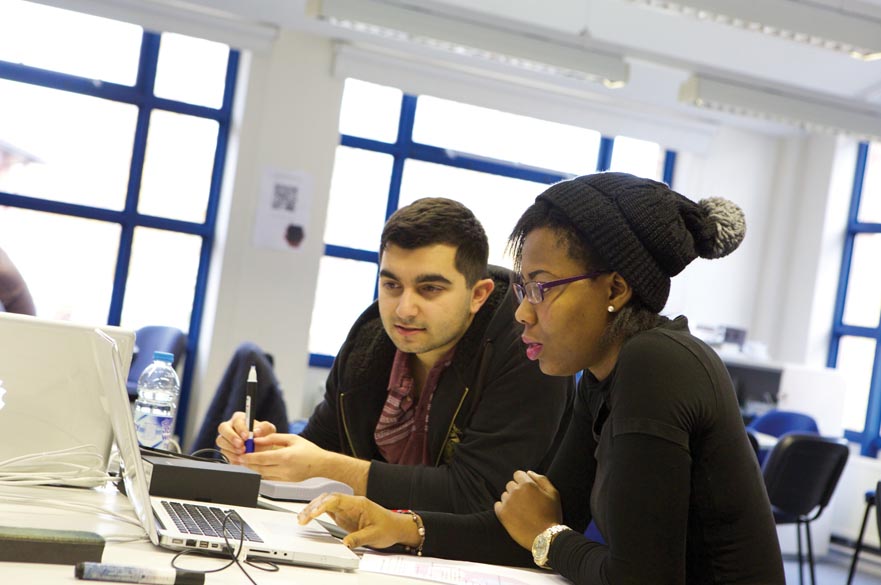Electronic Communications Engineering MSc
About this course
This postgraduate degree will furnish graduates with a greater understanding of imaging and display technology and smart mathematical techniques for engineering design and optimisation. The course emphasises the importance of independent learning, problem solving and self-organisation.
Combining computer science, electronic engineering, mechanical engineering and management, the course enables students to develop imaginative and innovative design solutions, enterprise, leadership and interpersonal skills.
What you’ll study
You will study six core modules and undertake a substantial Individual or Research Project.
Research Methods (20 cp)
The research methods elements of this module will focus on literature searching and critical reviewing strategies, ethical considerations, research design, sampling and quantitative and qualitative data collection and analysis techniques using applicable software tools.
Individual Industrial or Research Project (60 cp)
This module is the “capstone” project in which you will combine the knowledge, understanding and skills you have developed. You will investigate an engineering problem, implement solutions, critically evaluate and reflect on your work, and develop your abilities to communicate, self-organise and manage. The CPD component of this module will inform your learning journey throughout your MSc and after.
Cellular Networks and Internet of Things (20 cp)
Explore the technologies, protocols, and applications of cellular networks and their integration with the Internet of Things (IoT). You will gain knowledge and skills to design, deploy, and manage cellular-based IoT systems.
Advanced Digital Signal Processing (20 cp)
During this module emphasis will be on the theoretical foundations, practical implementations, and real-world applications of digital signal processing (DSP). You will cover spectral analysis, statistical signal processing and adaptive filters.
Embedded Systems and Sensors (20 cp)
Develop the skills and knowledge to create efficient and reliable embedded systems and interface them with sensors. You will learn how to apply them to various domains, including IoT, robotics, automation, and smart systems.
Wireless Communications (20 cp)
Understand the technologies and constraints of wireless communications and apply them to simulated and various practical wireless communication systems designs.
Group Design Project (20 cp)
During this module, you will focus mainly on the technical aspects of developing a cross-disciplinary group design project. The set projects will be taken from areas of advancing technology.
We regularly review and update our course content based on student and employer feedback, ensuring that all of our courses remain current and relevant. This may result in changes to module content or module availability in future years.
Don’t just take our word for it, hear from our students themselves
How you're taught
The postgraduate academic year is divided into three terms: term one has 10 weeks where you will study 40 credits; term two has 20 weeks where you will study 80 credits; and term three has 15 weeks. Those students who wish to continue on to the MSc will study 60 credits in term three.
The first two terms are spent studying the taught modules and the last term, pursuing an individual major project.
Study hours
Contact hours for a 20 cp modules are typically around 50 hours, with a further 150 hours expected from you for directed and independent study.
Assessment
You will be assessed by a variety of methods. The balance will be 28% exams (including practical assessments) and 72% coursework.
Research informed teaching
By daring to think differently our research is tackling real-world issues. The subjects you will study with us are informed by our research so you can be sure your knowledge will be cutting-edge in your field. In the last Research Excellence Framework (REF 2021) - the UK's system for assessing the quality and impact of research in universities - we’re proud that 98% of NTU's Engineering submission was assessed to be world-leading or internationally excellent.
Learn a new language
Alongside your study you also have the opportunity to learn a new language. The University Language Programme (ULP) is available to all students and gives you the option of learning a totally new language or improving the skills you already have. Find out more about the ULP.
Contact hours
Lectures / seminars / workshops (20%) and independent study (80%)
Careers and employability
Not only will you have enviable transferable skills at the end of this course, but you will also be perfectly placed to enter a range of careers in the industrial or engineering sectors.
The industry-focused nature of this course will ensure that you stand out from the crowd when it comes to job applications and pursuing your future career. NTU graduates are widely respected amongst employers and our Engineering students are perceived as having the competitive edge due to the hands-on approach of our teaching. Recently our graduates have gone on to work for a variety of employers in a wide ranging industries including companies such as Renishaw, Project Solar UK, Hull City Council, NHS, Siemens and Apiject.
Placement opportunities
NTU is one of the most employment-focused universities. Increasingly, employers want to recruit graduates who have real-world work experience. That’s why all of our courses, across every subject area, offer you a work experience opportunity. Our experts help build and support your future with a range of career programmes and events.
The school of Science and Technology will work closely with you to help find a placement and strengthen your CV and interview techniques. You'll be supported and assessed throughout your placement year and will write a reflective report and diary at the end of your placement. When you successfully complete your placement and submit your placement report, you will be eligible to receive an additional award of a Postgraduate Diploma in Professional Practice.
Please note that placements are not guaranteed and the process is competitive through an application and interview process.
If you take the sandwich route, you will take a one-year work placement after the first three terms before returning to NTU the following year to start your research project.
Our recent students have taken placements across a wide range of companies including Active Plan Consulting, Suman Chemical Industries and Techplus Solutions. They secured varied roles such as Software Engineer, Cloud Operations Officer and Business Analyst.
Re:search Re:imagined
To us, research is about more than writing papers and proposing new ideas. By daring to think differently, we’re disrupting the research landscape and finding the answers to the questions that really matter. From conservation management to sustainable farming, we’re inspiring the brightest minds to rise up and find solutions to some of the most significant global challenges facing society.
NTU Enterprise
You'll also have the opportunity to turn your ideas into a viable business with help from NTU Enterprise, NTU's purpose-built Centre for Entrepreneurship and Enterprise, a support centre to help students create, develop and grow their own businesses.
Campus and facilities
You’ll mainly be studying in the Engineering Building with access to facilities including our aero lab, VR suite and Robotics Test Arena.
Our self-contained, community-focused Clifton Campus has been designed to keep students busy between lectures. Catch-up with your course mates in the Pavilion’s barista café and Refectory; brainstorm group presentations in chic and stylish study spaces; enjoy some proper R&R in The Point, home of our Students’ Union. The campus also hosts the multimillion-pound Clifton Sports Hub, offering great options for everyone — whatever your interests, and however competitive you’d like to get!
You’re also right next to the bright lights of Nottingham — one of Britain’s top 10 student cities, and one of Europe’s top 25. All through termtime, a dedicated on-campus bus service will get you to the heart of the action (and back) in under 25 minutes. You’ll find a city stuffed with history, culture, and well-kept secrets to discover at your leisure: enjoy lush green spaces, galleries, hidden cinemas and vintage shopping by day, and an acclaimed food, drink and social scene by night.
Take our virtual tour to get a real feel for the campus.
Entry requirements
UK students
Academic entry requirements: 2.1 honours degree or equivalent in Engineering, Physics, Mathematics or related discipline.
Applicants with relevant employment experience or other relevant qualifications will also be considered.
Additional requirements for UK students
There are no additional requirements for this course.
Other qualifications and experience
We welcome applications from students with non-standard qualifications and learning backgrounds and work experience. We consider credit transfer, vocational and professional qualifications, and any work or life experience you may have.
You can view our Recognition of Prior Learning and Credit Transfer Policy which outlines the process and options available, such as recognising experiential learning and credit transfer.
Getting in touch
If you need more help or information, get in touch through our enquiry form.
International students
Academic entry requirements: 2.1 honours degree or equivalent in Engineering, Physics, Mathematics or related discipline.
Applicants with relevant employment experience or other relevant qualifications will also be considered.
We accept equivalent qualifications from all over the world. Please check your international entry requirements by country.
English language requirements: See our English language requirements page for requirements for your subject and information on alternative tests and Pre-sessional English.
Additional requirements for international students
There are no additional requirements for this course.
English language requirements
View our English language requirements for all courses, including alternative English language tests and country qualifications accepted by the University.
If you need help achieving the language requirements, we offer a Pre-Sessional English for Academic Purposes course on our City campus which is an intensive preparation course for academic study at NTU.
Other qualifications and experience
We welcome applications from students with non-standard qualifications and learning backgrounds and work experience. We consider credit transfer, vocational and professional qualifications, and any work or life experience you may have.
You can view our Recognition of Prior Learning and Credit Transfer Policy which outlines the process and options available, such as recognising experiential learning and credit transfer.
Sign up for emails
Sign up to receive regular emails from the International Office. You'll hear about our news, scholarships and any upcoming events in your country with our expert regional teams.
Getting in touch
If you need advice about studying at NTU as an international student or how to apply, our international webpages are a great place to start. If you have any questions about your study options, your international qualifications, experience, grades or other results, please get in touch through our enquiry form. Our international teams are highly experienced in answering queries from students all over the world.
Policies
We strive to make our admissions procedures as fair and clear as possible. To find out more about how we make offers, visit our admissions policies page.









